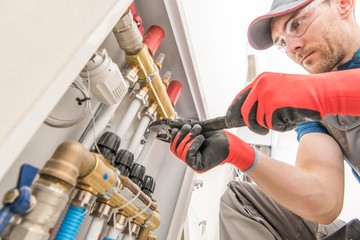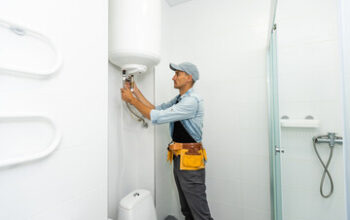Clearwater FL Plumbers are experts at fixing and maintaining plumbing systems in commercial properties. These systems are much more complex than those in residential homes and must comply with strict building codes.

In addition, leaky taps and inefficient heaters have a bigger impact in industrial settings because they waste more water and energy. This is why choosing the right commercial plumber for the job is important.
A commercial plumber has a unique skill set that is necessary to work in large buildings. They must be able to work within strict time constraints and adhere to a wide range of building codes. This makes it important to find a professional who will provide quality work and treat your property with respect. Choosing a qualified commercial plumber can help you avoid wasting valuable business hours due to plumbing problems.
Commercial plumbers are responsible for assembling, installing, and maintaining pipes for water and sewage. They must also be able to troubleshoot and repair complex plumbing systems that are often used by multiple people at once. Plumbing emergencies such as a burst pipe or clogged sink can cause serious problems for businesses, including lost productivity and customer dissatisfaction. Fortunately, a skilled commercial plumber can quickly fix these issues to minimize the damage.
Many plumbers are reluctant to work on commercial projects because they do not have the proper skills and equipment. However, the reality is that commercial plumbing is very different from residential plumbing and requires a lot of training, intelligence, and expertise. For example, the tallest building in Philadelphia uses over 249,908 gallons of water per day, and commercial plumbers are responsible for keeping that water flowing through the system efficiently.
The best commercial plumbers are bonded and insured. This ensures that they will be able to handle any problem and will not disappear after the job is completed. Additionally, it protects you from any potential damage that may occur during the project. It is important to ask a plumber whether they are bonded and insured before hiring them.
In addition to being licensed and bonded, a good commercial plumber should have plenty of experience working on different types of plumbing systems. They should also be able to provide references from past clients. This will allow you to see how well they have performed in the past. Finally, a good commercial plumber should be willing to provide a written guarantee or warranty for their work. This will give you peace of mind knowing that if something goes wrong with the installation or repairs, they will be available to fix it.
When you need plumbing work done in your commercial building, you don’t want to just call any plumber. You need someone who specializes in commercial plumbing, and is experienced in handling larger pipes and specialty fixtures. Also, look for a company that offers 24/7 emergency services. Plumbing emergencies can happen at any time, and when they do, you need someone who is available to help right away.
Experience is important in any type of plumbing, but it is especially critical for commercial plumbers. They have the skills and knowledge needed to diagnose problems, and repair them quickly and efficiently. They also have the experience to handle complex pipework and drainage systems. Additionally, they are familiar with the different plumbing codes and regulations that apply to commercial buildings.
In addition to being able to work with complex pipework and drainage systems, commercial plumbers must be able to do so in a shorter period of time than residential plumbers. This is because business owners often have to keep their facilities open while the repairs are being done.
Another factor to consider when hiring a commercial plumber is their ability to communicate with other employees and managers in a fast and effective manner. This is because large companies have multiple departments that must work together to ensure the smooth running of the business.
Lastly, a commercial plumber should be able to handle multiple projects at once. This is because commercial buildings have more water pipes and drainage systems than residential homes, and they are used by many more people. This means that they are at a greater risk of problems, and can have more serious consequences than residential issues.
When choosing a commercial plumber, it is important to consider their level of experience and the types of jobs that they have worked on. You can ask them for references from previous customers, and try to find out if they were satisfied with the service that was provided. Also, be sure to ask about the rates that they charge for their services. Some companies may charge by the hour, while others may include the cost of parts in their quote.
Commercial plumbers work on plumbing installations, repairs and maintenance for a wide variety of businesses, public spaces and building complexes. They must be licensed and qualified to work on these large systems and understand the unique requirements of each type of structure. Their duties include inspecting existing plumbing fixtures, interpreting blueprints, choosing the appropriate materials for commercial plumbing projects, and maintaining plumbing activities. They also need to have some basic carpentry skills for accessing pipes in walls and bracing them to keep them in place.
Commercial plumbing requires a lot more work and knowledge than residential plumbing. This is because these plumbing systems are used by hundreds of people daily, unlike the system in a single-family home. In addition, some plumbing problems can be very dangerous and impact the entire building. Commercial plumbers are skilled at quickly managing these situations to minimize damage and downtime.
A common problem with commercial plumbing is leaky faucets, clogged toilets and drains, and low water pressure. These issues can cause disruptions and affect employee productivity. Commercial plumbers are skilled at working on high-volume plumbing systems and can repair or replace any part of the system. They also know how to handle emergencies like sewer backups, burst pipes, and overflowing toilets.
Another important difference between residential and commercial plumbing is the size of the jobs. A typical residential job is limited to two floors, while a commercial project can involve many more stories. This means that the plumber will need to have a greater understanding of how gravity impacts water flow and has to deal with higher water pressures.
In addition, a commercial plumber will need to be flexible with their scheduling. They may need to work on weekends or outside of normal business hours. This is because commercial and office buildings are often occupied by hundreds of people daily, and they can’t afford to be without their plumbing for any length of time. In some cases, commercial plumbers must even create temporary plumbing facilities for a certain amount of time to complete their work.
Lastly, commercial plumbers need to be knowledgeable of different state plumbing codes and regulations. For example, there are regulations that dictate how much water a building can use per day. If these regulations are not followed, the building owner will need to pay for costly repairs and could face fines.
If you’re a commercial plumber, it’s important to carry insurance policies that protect your company from claims arising out of the work you do. A commercial general liability policy should be a minimum, and you can add on additional coverage such as workers’ compensation, business property and commercial auto insurance. You can also get an umbrella policy for added protection against catastrophic claims.
If your employees are injured or made ill while working on a project, you need to carry workers’ compensation insurance. This type of insurance covers medical expenses for your employees and a portion of their lost wages. Most States require that you carry this type of coverage for all your employees.
Your tools and equipment are a significant investment, so it’s important to keep them protected. Commercial plumbing companies typically have a policy called equipment insurance, which provides coverage for tools and equipment against theft, damage and loss. You can get this policy as a standalone or as an addition to your commercial general liability policy. Inland marine insurance is another option, and it can be used to cover larger pieces of equipment that are in transit.
Errors and omissions are unavoidable for even the most skilled plumbers, so you need professional liability insurance to protect your company against costly lawsuits. This type of policy covers legal fees and judgments awarded against you if a client sues over a job gone wrong.
The Hartford offers customized insurance coverage for plumbing businesses. Its business owners policy for plumbers includes general liability and property insurance, as well as workers’ compensation and business interruption coverage. It can be bundled with other types of coverage, including data breach and professional liability insurance.
You can also find commercial plumbing policies through other providers, including Nationwide, Chubb and CNA. However, they may have higher or lower quote rates than other providers. If you’re looking for a policy, you should compare quotes to find the best value. You can also look for a broker that can offer you the best rate for your specific needs. For example, if you need to cover a fleet of vehicles for your plumbing company, you should consider a carrier like Acuity.



